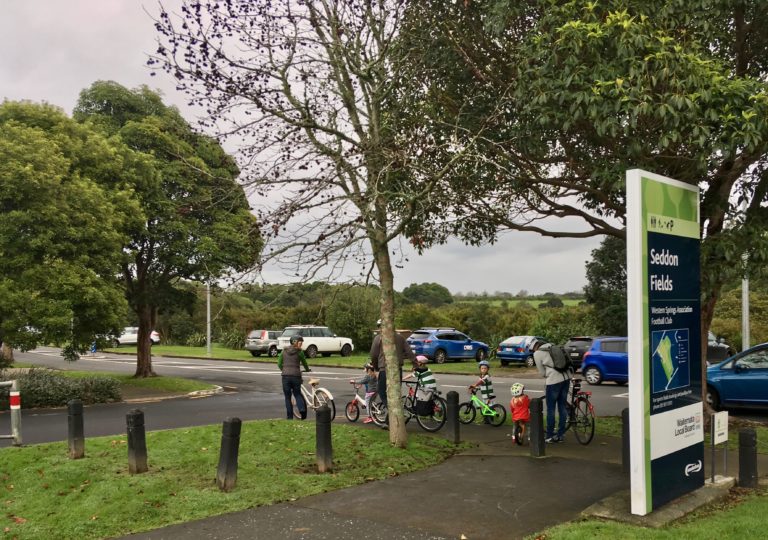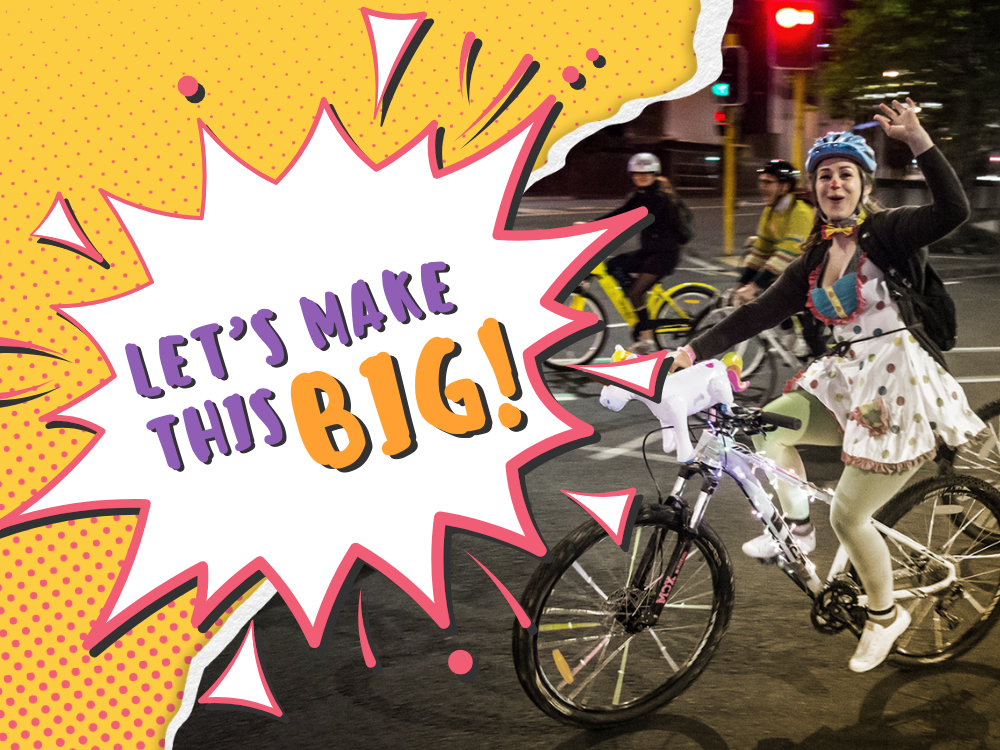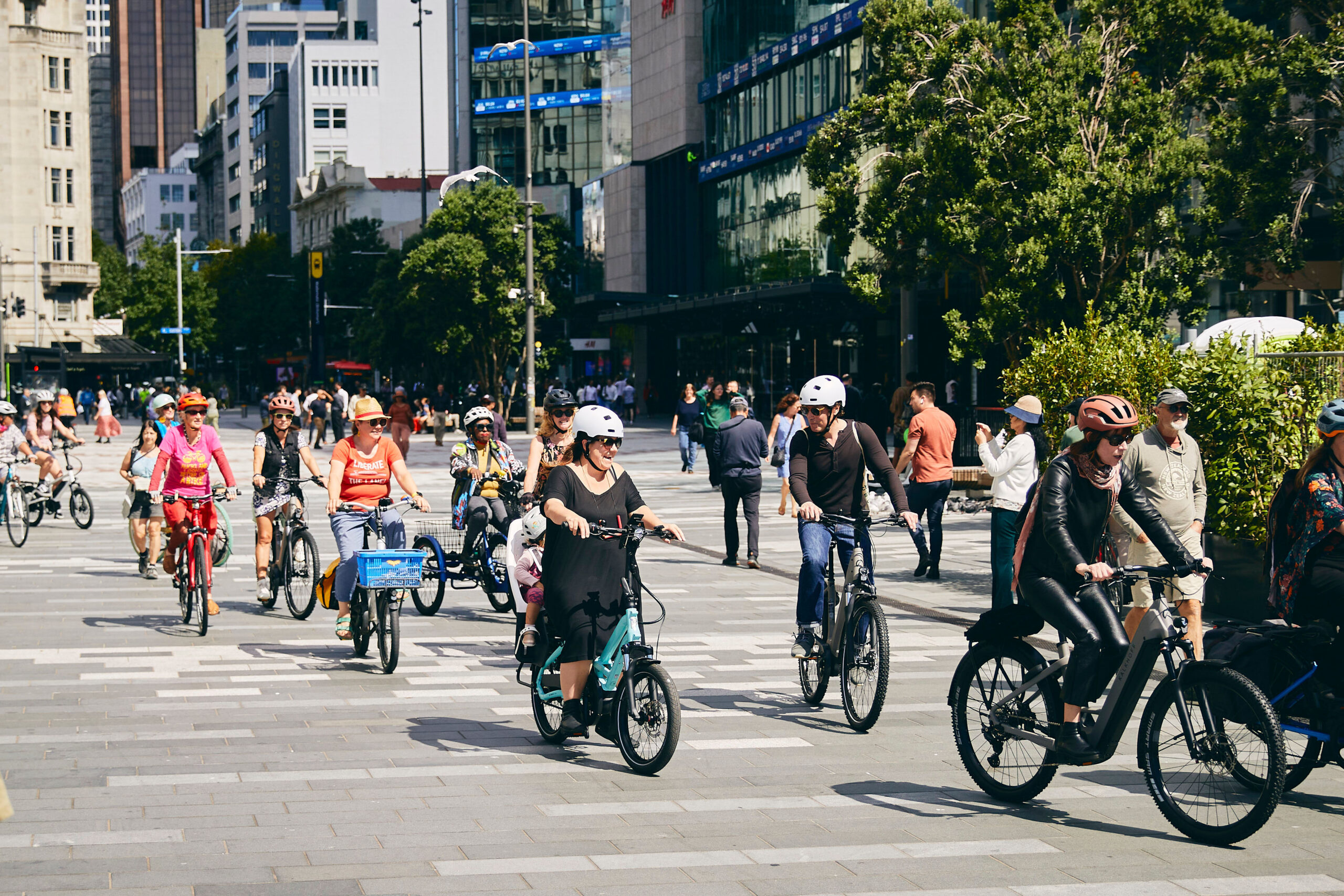Anyone who travels along Meola Road knows to beware Saturdays in soccer season. That’s because every weekend, the busy and popular Seddon Fields fill up with kids and parents who’ve come from far and wide – as well as from quite nearby.
And, because almost everyone arrives by car, the road fills up with parked cars, overflowing from the available parking spaces onto muddy berms and even on the footpath, and circulating like sharks looking for that one perfect spot.
Hence Bike to Football, a local initiative aimed at calming the traffic and organised by the dads behind the Point Chev School Bike Train, Matt Fordham and Nic Rowan. Inspired by the success of Bike Devonport’s effort a few years ago (now back up and running again this season), they’re encouraging those who can get to the fields by bike to give it a go.
Fair to say, the idea has been a raging success, with numbers at Seddon Fields exceeding expectations to start with, then doubling in the first two weeks. The sky’s the limit! And the message for the rest of Auckland is clear: feed the need.
The proposition
Bike to Football is a very simple offer: arrive on wheels, and get a voucher for a free sausage or hot drink. The Bike Point Chev folk keep an eye on your bikes, so you can relax and watch your kid play. And, as a bonus the teen fix-it crew from Adventure Cycles will do a basic bike safety check and let you know if your wheels need any repairs.
There’s also a mini-bike-train along Meola Road for those heading to the 9am matches. Although given the state of the roads, it won’t come as a surprise that this travels along the footpath, dismounting and walking the very skinny bit over Meola Creek.
The project has solid backing from key partners, with bike racks, maps, bells, and lights and supporting budget from Auckland Transport; and assistance from Bike Auckland via our Bike Burbs programme.
And it’s enthusiastically supported by the Western Springs Association Football Club. Says Phillip Dunn, Junior Chairman of WSAFC, “Many of our teams carpool to the club, and Bike to Football further helps to free up the roads (and parking) while we continue to work with Council and other stakeholders to ensure the best improvements for the current roading, parking and cycling situation. After school during the week or on the weekends our roads are jammed (literally) and parking is chaos at best. Counter that with the many benefits of getting to football on a bike; better physical fitness and mental wellbeing, less stress, and it’s a great warm-up. We’re proud to help bring this option to our members, their whanau and our community.”
For now, Bike to Football only operates during two sessions: the 8am and 9am junior games on Saturdays. We’re talking four to seven-year-olds: very little kids, with very busy/ tired parents. How many of them would want to hop on bikes first thing on a Saturday morning, even if tempted by the prospect of a free sausage or a coffee? That was the question.
Result!
Knowing that a hardcore dozen or so already biked to soccer on Saturdays, Matt and Nic expected 20, maybe 30 bikes on the first day… and were overrun by 74 adults and kids on bikes on Day One!
A phenomenal start. As Matt says, “Huge respect for the 5 year old kids and their parents leaving home at 7.30 am on a foggy or chilly morning to get there.”
Roll on Week Two, and the team was braced for more… but no way did they expect over 130 people to arrive on bikes! As well as finding space for all the bikes, they ran out of lights, bells, maps… as well as bike rack space.
A map survey helped find out where people were coming from, and how many at a time. As expected, most were from nearby Pt Chevalier and Westmere – but others came from further afield, from the city end of Grey Lynn; from Mt Albert; and from Waterview. Lots of parent-child pairings, but also a lot of whole-family expeditions.

According to the map, ~49 family groups didn’t arrive by car; which would mean 98 fewer car movements along Meola Rd and across side streets and in and out of driveways. It’s not just about taking up fewer parking spaces around the sports fields. At the grand scale, this is a win for safer streets, DIY climate action, better health, and more connected communities.

But how do we get there?
What’s so striking about these numbers is that families biked to football despite the conditions, not because of them. There are no safe, continuous, connected and protected bike routes to the fields from any direction… yet.
But there could be, and in fact there should have been by now. The Waitemata Safe Routes, linking Great North Road from the city end, all the way along Surrey Crescent, Old Mill, and Garnet Roads, were originally due for completion by mid-2018.
The project was paused after protests, then got an exemplary, world-class redesign from the bottom up. The fresh design was taken back to the community for feedback in November-December 2018, receiving 1084 submissions. Since then, crickets – but the feedback summary should finally be out in the next month, and we hear it’s positive. AT says it is reviewing the design, and hopes to have a final version to share ‘in the next few months’.
The Point Chevalier routes have also drifted into a sort of slumber. After beginning with a very positive community engagement, including conversations with the Albert-Eden Local Board on how to plug the gap between the planned protected bike lanes and the primary school, the community liaison group hasn’t met since late last year.
Meanwhile, the need grows and grows. Yes, delays happen, but in the months since these projects sailed past their original deadlines, a pedestrian was killed on Great North Road, a mother and child were hit by a car while walking bikes on the crossing outside Grey Lynn School, and the Travelwise students from Western Springs College have started a petition for a crossing on Meola Road, saying ‘We want to take care of you and make our roads a safer place.’
Will AT build a crossing in the short term, if it already has plans to reshape the street in the medium term? But what if that turns into the long term? When will those local kids – indeed all of us – get the stress-free streets they’re asking for? You have to wonder, do the business cases for these projects count the cost of the delays?

Connecting the community in the meantime
These lengthening delays are disappointing – and not just because of the safety risks. More positively, imagine how many people might choose to go by bike once the streets are up to scratch for all ages and abilities. Not just to football – to school, work, shops, the beach, and for fun, whenever it suits.
Frustration with the slow delivery of local bikeways was just one of many topics discussed around the Bike to Football tent. Other conversations covered the surprising ease of the bike trip (even with one or two kids whose enthusiasm levels returned after a hot Milo), and the fact that it hadn’t taken any longer than going by car. Parents were also swapping tips about bike routes, and making plans for their homeward journeys after the game.
Matt and Nic, who co-organised the initiative, were stoked if a little overwhelmed by the enthusiastic uptake. “We learned so much in the first week about how to run this efficiently… and we learned even more this week!”
One parent helper joked that it was amazing what Kiwis would do for a free sausage. But Matt and Nic reckon it’s as much about families discovering what’s possible, and enjoying a feeling of accomplishment. Their own children and fellow young team members were helping keep things running, welcoming new arrivals and keeping an eye on the bikes. Jim the dog greeted fellow canines, and the bike tent was a hive of activity and information across the morning.
So, what next?
With two more weeks of Bike to Football to go before the school holidays, the obvious question is: how to keep that energy going? The hope is that people will just keep biking, although it would be great to continue some kind of positive reinforcement for community-friendly choices. A whole lot of permanent bike racks would be an excellent start.
Speaking of parking: there are moves towards a precinct-wide parking plan (for people driving to the Zoo, MOTAT, Western Springs College, and football), using a gravelled area up behind the football club rooms. Certainly, moving parking off Meola Road would help free up space for better walking and biking, and allow the buses to flow more easily at busy times.
The good news is that last weekend’s free public transport experiment revealed Aucklanders are hungry for alternatives to using the car, and willing to give it a go. We’re also more and more eager for ways to do our bit to solve the climate emergency for our children and our future.
This might be why the Bike Point Chev team has already been contacted by several other football clubs across the city, desperate to learn how to replicate their success. The team is happy to share the special sauce – a key ingredient of which is special people who throw themselves into making things happen.
Looking ahead and looking beyond
Above all, Bike to Football’s instant success vividly demonstrates some very important things about people, and transport, and community.
Firstly: people will bike more when barriers are removed, even and especially children. Simply by supplying bike parking and warm encouragement, the pilot scheme has quintupled the number of people choosing two wheels over four. Removing the feeling of danger from the journey there and back would only lift that number.
Of course, those coming from further afield – or encumbered by gear – may still choose to drive. But they’ll enjoy more free-flowing streets on the way, and more and safer parking options when they arrive. The more who bike, the merrier for everyone.
Secondly: bike travel is an incredibly efficient use of space – and what a colossal waste of space and energy it is when everyone makes every journey in a car! Not only the platoons of vehicles travelling along the clogged roads, holding up buses and making it hard for pedestrians to get across. But also, the grim game of Tetris once those vehicles all arrive at once and need to park. By contrast, even 130 bikes are an easy squeeze.

Thirdly: it’s about the vibe, to quote that all-purpose movie, The Castle. Soccer is an active and engaging activity that brings kids and families together, rain or shine, to play their part. Talk and connection happens on the field and on the sidelines that helps knit the community together.
Bike to Football carries that camaraderie on beyond the game. Watching the families arrive and leave by bike on Saturday, chatting as they came and went, really brought that home.
So what will all these wonderful, active families need to convince them to keep coming by bike to football, and adding other trips to their repertoire?
They’ll need to have great experiences en route, free of heart-pumping moments of seeing a driver cutting too close beside their child, or hair-raising conflicts when bikes cross paths with cars in less than ideal fashion.
That means Auckland Transport will need to deliver on its promise of neighbourhood bikeways, fast. It’s time for our transport leaders to step up and follow the example shown by so many progressive countries: low-traffic neighbourhoods are bringing healthier air and happier, more active people to streets previously clogged with cars. Let’s embrace that freedom here!

















